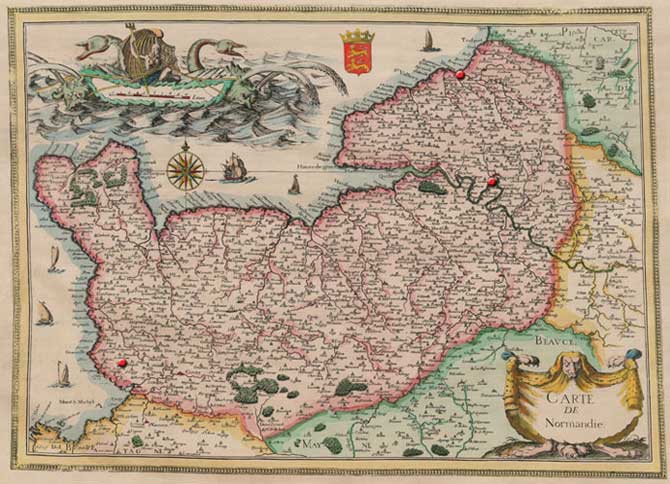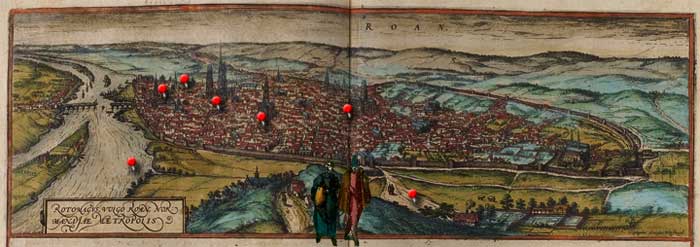Normandie.

Normandie.
The subtle scent of apple blossoms wafts throughout Normandie every spring. Since the Middle Ages the orchards have produced bushels of the sweet fruit which farmers crush into cider or ferment to make a fine Calvados, an apple brandy. The brew may be paired with one of the area's delicate soft cheeses like the nutty Livarot or the buttery Camembert. Its shoreline stretches for hundreds of miles along La Manche providing easy access to a bounty from the sea to add to its rich agricultural base.
It was a region besieged by Vikings and the one that spawned William the Conqueror. The Gauls, tribes of Celtic and Belgic peoples, were conquered by the Romans in the first century. During their rule they built beautiful villas, and grew crops of wheat and linen. In the late 400's the area was overtaken by the Franks who gave their name to France. Normandie itself was named for the Nortmann/norsemen or men of the north whose raids started early in 800 AD/CE. In the middle ages, the Vikings sought easy plunder from the riches stored in churches and monasteries. Their domination of the seas allowed them to move freely through the channel separating the British Isles from mainland Europe. They often settled in the lands they conquered, intermarried, and formed alliances.
In 1066 Guillaume le Conquérant, seized England. For a time the Channel Islands were a part of the Norman duchy. Throughout the 11th century the territory was assaulted from all sides, from Bretagne, Anjou and from the Germans. The barons of Normandie successfully lobbied the King of France for some degree of self-rule which was granted through the Norman Charter in 1315.
Sieges of Rouen.
The wall surrounding the city was built by the Romans. Though protected by 60 towers manned by arbalétriers, Rouen fell after a six-month siege by the English ending in Janaury 1419 during the Hundred Year's War. The starving city had ejected its poorest residents to relieve the food shortages, though the attackers did not allow them to leave the area. City residents were barely scraping by eating rats while 12,000 poor people died in the ditches surrounding the fortifications.
As part of the Ancien Régime the area was ruled and taxed more directly under the French king, but the province maintained a conseil souverain seated in its capital in Rouen.
Though Catholicism remained the predominant religion, Calvinism took hold in the region, making the town a target during the Wars of Religion. Catholics claimed victory after a siege in the fall of 1562. Protestants besieged Rouen from December 1591 until May of the following year. Even so, the city held on until Spain provided assistance and thus evaded capture by the Huguenot King Henry IV of France.

The Seine River allowed big ships to navigate to the town allowing trade with distant ports. Throughout Normandie in the 1700's the shipbuilding, weaving and metallurgy industries grew in importance.
Our ancestors who emigrated from Normandie are listed below. The dates reflect the year they arrived in Canada if known, otherwise it is the date of their earliest appearances in the records there:
- Nicolas Patenaude (1651) of Rouen.
- Pierre Vallée (1657) of Saint-Saëns.
- François LeBer (1658) of Rouen.
- Jeanne Testard (1662) of Rouen.
- Marie DeBure (1665) of Rouen.
- Jacques Têtu (1665) of Rouen.
- André Lamarre (1665) of Rouen.
- Jaques Saint-Yves(1668) of Rouen.
- Nicolas Varin (1697) of Dieppe.
- Pierre Pétel (1746) of Sartilly.
- Carte de Normandie, author's collection
- https://www.gutenberg.org/files/42899/42899-h/42899-h.htm#page_084; Rambles in Normandy; Author: Francis Miltoun
- www.wikipedia.org Siege of Rouen
- ROUEN By Georg Braun; Frans Hogenberg - Georg Braun; Frans Hogenberg: Civitates Orbis Terrarum, Band 1, 1572 (Ausgabe Beschreibung vnd Contrafactur der vornembster Stät der Welt, Köln 1582; [VD16-B7188)Universitätsbibliothek Heidelberg https://diglit.ub.uni-heidelberg.de/diglit/braun1582bd1, Public Domain, https://commons.wikimedia.org/w/index.php?curid=9833108
- The Story of Rouen, J. M. Dent & Co., London: 1899 Theodore Andrea Cook
